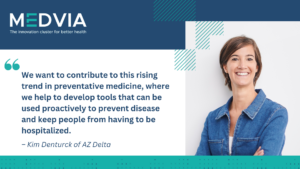Prioritizing health innovation can be a challenge for hospitals, but MEDVIA member AZ Delta is actively driving a series of projects on AI and health data. What is the secret ingredient for this Flemish hospital? And what are the hurdles preventing other hospitals from pursuing innovative projects of their own?
10 April 2024

Hospitals these days generate an extraordinary amount of real-world data – information on patient health derived from a variety of sources such as electronic medical records or medical imaging procedures. These data can be used to gain valuable insights into health and disease and to develop new tools for improved healthcare, such as better diagnostics or personalized treatments. However, hospitals often find it difficult to prioritize spending precious resources on innovative projects.
One Flemish hospital putting tremendous effort into innovative projects is AZ Delta in Roeselare. A few years ago, it established the RADar Learning & Innovation Centre. “Our mission is to enable the prevention, detection and treatment of diseases in a personalized and precise way,” says Peter De Jaeger, Chief Innovation Officer at RADar and Director IT & Data at AZ Delta.
Key to this process is “leveraging cutting-edge technologies and data-driven insights,” he says. “We’re working with our physicians to incorporate new technologies like AI, creating new tools that can support both clinicians and patients.”
AI projects to support doctors
Since its inception, the team at RADar has been busy with a string of projects focusing on data-driven healthcare research. The first data-driven project to be funded was ADAM, short for Advanced Data-Aided Medicine.
“The aim of the project is to develop an AI model that supports the decision-making process for physicians treating lung cancer patients and patients with coronary artery disease,” explains Kim Denturck, the center’s Innovation Coordinator. “It helps them identify the optimal treatment plan.”
The center has initiated more than 15 research projects to date, including three supported by MEDVIA: ProCaTS (a CDSS – Clinical Decision Support System – in prostate cancer), BreaCS (a CDSS in breast cancer) and PhonAID (a CDSS for voice disorders).

PhonAID is the most recent project, launched at the start of 2024. MEDVIA supported the consortium – consisting of AZ Delta together with EIORL, Goomyx and ELG De Piramide (a center for general practitioners) – with the grant-writing process.
“The aim is to build an AI-based application that can be used by GPs when seeing patients with voice issues,” explains Denturck. “Physicians usually don’t have voice-specific expertise or the instruments necessary for a specific diagnosis. They have to decide whether to refer patients to a specialist based on the information they can gather during an appointment.”
PhonAID can be used to record a patient’s voice. Based on that and additional clinical information submitted by the GP, it makes a prediction as to whether a referral is needed, as well as a potential high-level diagnosis.
In addition to supporting GPs, AZ Delta is hoping this instrument will offer patients with a measure of reassurance if the matter isn’t urgent. “For patients who have lost their voice and have no idea what the underlying cause might be, this can either be a reassurance that chances are low of having an actual voice disorder or (for cases where concerns are identified) it enables a swift and prioritized referral. This tool should help improve their experience,” says Denturck.
Physicians seeking solutions
How does AZ Delta determine which projects to pursue? De Jaeger says it’s very simple: “Our projects are determined by our physicians. They’re the ones driving innovation by reaching out to us with real-time problems, which we then try to help them solve.”
According to Denturck, they also flag opportunities, “bringing new technologies or tools to our attention that could benefit them and other healthcare providers.”
This active participation by AZ Delta physicians is what De Jaeger considers to be the hospital’s greatest strength in innovation. “Having passionate and driven physicians makes a fundamental difference to the quality and efficiency of our R&D endeavors,” he says. “When working on any healthcare project, you’re going to need feedback from both patients and clinicians. For a commercial company, that can prove challenging, with long waits between reports and little direct contact. This is why we have a real edge as an innovation partner. Our feedback loops are short, as simple as picking up the phone. It’s a tremendous advantage that enables rapid health innovation.”
AZ Delta works together with many different partners, including companies, universities and other hospitals. Currently it is collaborating with 8 hospitals in Belgium to transform and harmonize its real-world data towards an international standard model called the Observational Medical Outcomes Partnership (OMOP).

“We are trying to provide other hospitals with our expertise because we want to work together and we need to align and standardize,” explains Denturck. “We want to contribute to this rising trend in preventative medicine, where we help to develop tools that can be used proactively to prevent disease and keep people from having to be hospitalized.”
Preventative healthcare is on the rise around the world. It is already contributing to patients spending less time in hospitals than they used to, in part thanks to an increase in early diagnosis, telemedicine and at-home treatments.
“We’re not currently funded for it, but it would be nice if hospitals in Belgium could work together with other healthcare providers to integrate our data with real-world data from, for example, GPs,” says Denturck. “This would make a dramatic difference to our research insights and the quality of the digital tools we create, as most of the data in hospitals represent people who are already quite ill.”
Hurdles for hospitals wanting to help
AZ Delta is a shining example of a hospital embracing AI, data science and digitalization, using these new technologies to drive health innovation. But this activity hasn’t come easy. Innovation at AZ Delta, as with other hospitals in Belgium, face the twin hurdles of regulations and funding.
“We are here for healthcare, not because we like doing R&D,” Denturck emphasizes. “At the end of the day, we want improved outcomes for patients as a result of our projects. To help patients on a broad scale, we have to go from a prototype to a product – but certification is a lot of work, and finding funding for it is very difficult.”
There is a huge gap, she continues, “between the money needed at the Technology Readiness Levels of research and development and the funds required to get a new technology approved by the EU Medical Device Regulation. Even if we develop a great AI tool, finding the financing and partners to get that product through clinical trials and regulations is a significant challenge.”
“It’s a big issue,” De Jaeger agrees. “To make it easier for Belgian hospitals to participate in innovation, we need more support for certification, and we also need more budget allocated to projects at the earlier research stages. It astonishes me that hospitals have all the ingredients necessary for health innovation – the knowledge, the data, the clinicians, the patients. And yet there is a severe lack of funding for projects. We spend so much of our time writing project proposals for grants; it becomes an insurmountable obstacle for many hospitals.”
Another suggestion is for incentives to be provided to Belgian hospitals that prioritize improving the quality of their data. “Currently, we’re not being recognized for that,” Denturck explains. “But hospitals that work hard to implement systems like OMOP and get their real-world data to a point where large-scale collaborations between hospitals are possible – we think their efforts should be rewarded.”
“What we do is all about collaboration,” De Jaeger concludes. “It’s about taking lots of independent, unstructured data and creating a system and tools that can be used by the whole healthcare system. Innovation like this needs everybody to be invested in it, but it also benefits everyone in turn. To me, that’s what makes it such a nice topic to work on.”
By Amy LeBlanc



